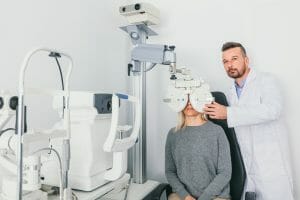The harmful effects of smoking on the lungs and heart has been known for a long. However, many people are not familiar with its effects on your eyes and vision. To put it simply, smoking can cause vision loss or blindness.
Many studies have found that smoking is a major risk factor for cataracts, age-related macular degeneration, dry eye syndrome, and diabetic retinopathy and glaucoma.
-
Cataract:

Heavy smokers, those who smoke 12-15 cigarettes a day, have a three times higher risk of developing cataracts than nonsmokers.
A cataract is a blurring of vision due to the clouding of the eye’s clear lens. Older people are more likely to develop cataracts, and it may get worse as we get old. Almost everyone develops cataract or have had cataract surgery by the age of 80 years. Just make sure that you ensure contact lens price in Pakistan so that you get the best price.
-
Age-Related Macular Degeneration (AMD)
Quit smoking is one of the most effective ways to reduce the risk of developing age-related macular degeneration. People who smoke are at a 3-4 times greater risk of developing AMD than nonsmokers.
The nonsmokers double the risk of developing age-related macular degeneration if they are living with smokers.
Age-related macular degeneration starts with the loss of central vision, making it difficult to read and see fine details. Vision loss increases with time.
There are two types of AMD, i.e., wet and dry. Dry AMD is more common than wet AMD. In dry AMD, fatty deposits form on the light-sensing cells in the retina. Wet AMD is caused when the small blood vessels in the back of the eye leak and breaking open. Wet AMD forms scar tissues. Wet AMD is less common, but it harms vision more quickly than dry AMD. AMD can lead to permanent vision loss and blindness. IMPAIRED CENTRAL VISION Smoking increases your risk of developing age-related macular degeneration (AMD).
-
Dry Eye Syndrome
Smokers have twice as many chances of having dry eye syndrome as their nonsmoker friends.
Dry eye is an eye condition due to a lack of tears in the eyes. Blood vessels appear to be damaged, which leads to eye irritation, scratchiness, itching, and burning sensation in the eyes. Quitting smoking at any age can reduce your risk of developing many sight-threatening eye conditions. Visit smokefree.gov to get started, or see your doctor, who can recommend other methods to help you on your journey to a smoke-free life.
-
Diabetic Retinopathy
Smoking increases the risk of diabetes in a person. It makes controlling diabetes harder for those who already have it. Complications of diabetes like heart disease, retinopathy, vascular disease, stroke, kidney disease, foot problems, nerve damage, and many others can get worse due to smoking as well.
It is a common complication of diabetes that affects the blood vessels at the back of the eye. These blood vessels leak, get blocked, or break down, which affects vision loss over time.
Sometimes, serious damage to the eye occurs when new blood vessels start to grow on the retinal surface.
-
Glaucoma
Smoking is strongly linked with high blood pressure, diabetes, and cataracts, all of which are high-risk glaucoma factors.
Glaucoma can cause the breakdown of the nerve cells that send visual signals to your brain called optic nerves. This breakdown of the optic nerve causes gradual vision loss, starting from the peripheral vision to the center. Usually, glaucoma is hard to notice unless large damage has occurred. Most people with glaucoma are unaware of this condition. Therefore, it is necessary to get your eyes examined by an expert at least once a year to diagnose them earlier, and contact lenses are branded. Uveitis harms the structures of the eye and can lead to cataract formation, glaucoma, and retinal detachment, and vision loss.
What to do to Prevent Vision Loss?

Developing healthy habits will be the first step in this direction. The risk of eye problems and your overall health can be lowered by following these tips, which require a lot more than just determination:
- Quit smoking. We know it can be harder than said. You can use different techniques and products that can help you quit smoking. Keep trying, and you will succeed one day.
- Develop healthy eating habits. Add more fruits and vegetables to your diet. Also, consume dairy products and meats.
- Work out every day.
- Control your cholesterol and blood pressure
- Pay a visit to your eye doctor once a year.
How does smoking affect your brain?
The brain develops extra nicotine receptors to accommodate the large doses of nicotine from tobacco. When the brain stops getting the nicotine it’s used to, the result is nicotine withdrawal.


